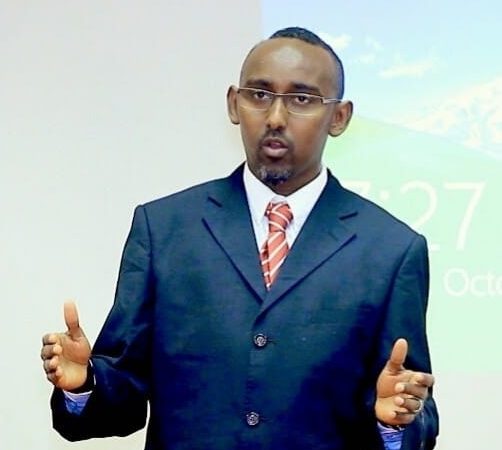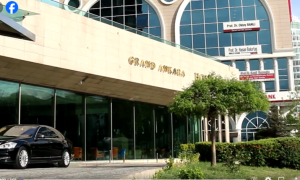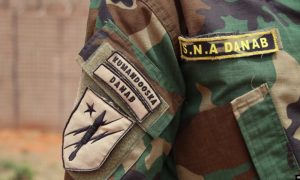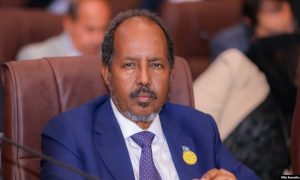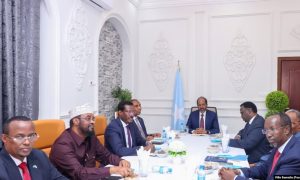
Article.
Somalia lifted the Army Embargo and Eliminated Al-Shabaab.
AUTHOR,
MOHAMED H. SALAD
Researcher and Analyst
International Security
Special Horn of Africa
Executive Summary:
After the international weapons embargo was lifted, Somalia’s peace and security struggle will change. This momentous verdict may provide the Somali government with the military equipment to battle Al-Shabaab. By lifting the embargo, Somalia will get much-needed military equipment and aid. The expanded capability may be used to fight Al-Shabaab, restore control in affected regions, and boost internal security. Somalia’s struggle against Al-Shabaab requires international help. After the embargo has lifted, the international community may train, share, and fund Somalia’s anti-terrorism efforts. Even if progress is promising, problems persist. Using enhanced military capabilities ethically is essential. To achieve long-term progress and peace in the neighbourhood, we must diplomatically tackle extremism’s foundations. Military actions won’t eliminate Al-Shabaab. Deradicalisation, information collecting, and community involvement are needed to combat extremist ideology’s diverse challenges.
Somalia was in political and civil strife in the early 1990s when the army embargo started. Because of concerns about military resource misuse and armament proliferation, the international community implemented the embargo to delay the conflict and seek a peaceful settlement. In recent years, Somalia has been more relaxed, making it more explicit that the Somali National Army (SNA) must be strengthened to combat Al-Shabaab. Al-Qaeda-affiliated extremist group Al-Shabaab has caused a spike in bloodshed in terror attacks and prevented Somalia from forming a government. The international community has had to rethink its threat response due to the group’s ability to exploit the security breach created by years of conflict.
Introduction.
The lifting of the international arms embargo has been a watershed event for Somalia, a country that has endured long-term strife and the plague of terrorism. In Somalia’s fight against the infamous terrorist organisation Al-Shabaab, this crucial choice is of the utmost importance. This piece explores the consequences of the removed army embargo and the continuing efforts to eradicate the Al-Shabaab threat. Somalia has made great strides towards peace and security since the army embargo was lifted. After years of limitations that prevented it from adequately arming and fortifying its military forces, Somalia is now at a crossroads where it can step up its efforts to counter domestic challenges, most notably the mighty Al-Shabaab.
More than just loosening limitations, lifting the embargo represents a fresh chance for Somalia to strengthen its defences. The resources and tools that the government needs to tackle security issues may now be accessed. The liberation of long-held territories from the grip of extremists depends on this empowerment. However, one must use caution while using this enhanced power. To preserve human rights and promote national unity, the Somali government must ensure that the increased military might is utilised responsibly. Maintaining stability and advancement over the long term requires finding this equilibrium.
The international community’s involvement is crucial as Somalia emerges from the army embargo. When the blockade has lifted, the international community can work together to help the Somali government with extra-training, sharing information, and providing resources. By working together, we can strengthen counter-terrorism measures and go closer to our ultimate aim of making Somalia a safe and stable place for everybody. There is little question that lifting the arms embargo is a step in the right direction, but problems still exist. It is critical to tackle issues like poverty and political instability that contribute to extremism. Indeed, buying tanks and other heavy weaponry is not urgently needed by the Somali government right now. To completely eradicate Al-Shabaab, the Somali government and its foreign supporters must keep seeking political and diplomatic solutions in addition to military efforts. What follows is an in-depth examination of the difficulties encountered, the tactics now in use, and the consequences of the loosened arms embargo in the fight against Al-Shabaab. All these things come together to form a story about a country fighting for a better future, free from the chains of war and terrorism.
The Ideological Battle: Nationalism as a Key Weapon.
When people and organisations adhere to a shared ideology, it informs their daily decisions, priorities, and practice. Militant groups like Al-Shabaab use grievances—whether genuine or imagined—to further their ideological goals. To combat this, governments and security agencies must fight not only the physical dangers but also the ideological allure of extremist ideology. A powerful counter-ideological strategy is nationalism, which is defined as a strong feeling of allegiance and commitment to one’s homeland. In Somalia, where tribal conflicts have long caused internal instability, nationalism serves as a uniting factor. Somalia hopes to build a united society that can withstand the polarising strategies of extremist organisations like Al-Shabaab by fostering a sense of national unity along old fault lines.
Sometimes, extremist groups may take advantage of people’s frustrations and divides in order to enlist their support. By promoting a feeling of community and one purpose, Somalia’s nationalist movement hopes to thwart this enrollment tactic. By advocating for a story that emphasises the importance of being a country, we may make it harder for radical beliefs to gain followers and followership. Used correctly, nationalism fights extremism from the inside out, not just the outside. Somalia hopes to build a strong society that rejects violent extremist ideologies by providing its citizens with a strong sense of national identity and purpose. Important steps towards breaking the radicalisation loop and reducing the allure of extremist ideology may be taken with this preventive strategy. As a counter-ideological instrument, nationalism in Somalia has wider ramifications for the worldwide struggle against terrorism. This shows how countries can’t only use military force to counter extremism; they must also remove the ideology that fuels it. Considering other countries’ struggles, Somalia’s approach demonstrates the value of a holistic strategy including ideological and military elements.
Ongoing Efforts war on Al-Shabaab.
The Somali government and the world prioritise fighting Al-Shabaab. Defeating the terrorist group is a high priority in the Horn of Africa because it threatens regional security. Military activities are essential to fighting Al-Shabaab. The Somali National Army (SNA) undertook strategic offensives alongside AMISOM and other partners to degrade and destroy Al-Shabaab’s operational capacity. These military operations aim to liberate group-controlled territory, damage infrastructure, and cut off safe-havens. Somalia and its allies must work together to fight Al-Shabaab. Information sharing, military training, and initiatives to develop Somali security forces are coordinated to improve them. The international community has pledged to fight extremism together. The fight against Al-Shabaab includes intelligence gathering, analysis, and military action. Improved counter-terrorism information is essential for finding and removing the group’s leaders, cutting off their financing, and foiling future terrorist plots. Collaborative intelligence-sharing helps counter Al-Shabaab’s ever-changing strategies.
Engaging communities and opposing extremist narratives are part of ongoing attempts to address root causes. Programmes should prioritise social cohesion, education, and economic development to decrease Al-Shabaab recruitment of vulnerable individuals. Additionally, counter-messaging campaigns try to discredit extremist propaganda and battle it, making it difficult for the group to capitalise on complaints and recruit new members. Military and security measures against Al-Shabaab are necessary, but so is the determination to cope with humanitarian repercussions. Humanitarian assistance projects aim to alleviate suffering, supply essentials, and foster recovery. These activities are part of a counter-terrorism strategy that recognises humanitarian-security interconnectedness.
In the fight against Al-Shabaab, the Somali National Army’s pay and well-being are crucial. A moral and competitive SNA compensation coincides with justice and fairness and boosts morale, loyalty, and the SNA’s ability to resist Al-Shabaab. Ethical and competitive compensation boosts SNA morale. Recognition and compensation for these frontline workers’ efforts are crucial to preserving motivation and devotion. Maintaining talented military personnel and recruiting fresh recruits requires competitive compensation. A well-paid military is more likely to commit to long-term goals like fighting Al-Shabaab and guaranteeing regional security. Moral salaries help professionalise the SNA. Adequate remuneration enables the training and discipline of a military force that can confront Al-Shabaab’s shifting tactics. A fair and competitive military compensation system may help reduce corruption. Paying employees well reduces corruption and ensures effective and transparent resource allocation.
Challenges.
A new phase in Somalia’s fight for peace and security has begun with the recent lifting of the army blockade. There will be many obstacles to Al-Shabaab’s eradication, but this is a big step forward. Complex challenges requiring sophisticated and all-encompassing solutions include clan relations, justice concerns, inequality, and socioeconomic circumstances. A cohesive national government has always been hindered by the intricate clan dynamics that have always been interwoven into Somalia’s political environment. Collaboration in the fight against Al-Shabaab may be hindered by sectarian allegiances and long-standing animosities among the security services. To tackle these dynamics, we need inclusive political mechanisms that unite clans, strengthen trust, and unify them against extremist danger.
The post-embargo approach must prioritise the pursuit of justice for the victims of Al-Shabaab’s crimes. Setting up a solid legal system that holds the extreme organisation accountable for their actions is critical. This requires overcoming obstacles, including gathering evidence, guaranteeing fair trials, and maintaining legal standards. Finding a middle ground between pursuing justice and fostering national reconciliation is crucial for achieving long-term peace. The stability of Somalia is threatened by the country’s persistent inequality and socioeconomic inequities. Extremist organisations like Al-Shabaab take advantage of people’s weaknesses, which are brought about by things like unequal distribution of resources, a lack of economic possibilities, and insufficient access to essential services. To reduce poverty and promote social cohesiveness, it is necessary to implement targeted socioeconomic policies and invest in infrastructure, education, and the development of jobs.
With the army embargo lifted, the Somali National Army (SNA) will have a chance to strengthen its capabilities. However, the efficacy and integrity of changes in the security sector continue to face obstacles. Building a professional and competent military force that can fight Al-Shabaab while winning the populace’s confidence requires addressing issues like corruption, inadequate training, and equipment shortages. Military efforts alone will not be enough to eradicate Al-Shabaab. If Somalia wants to be stable in the long run, it must solve problems with clan dynamics, improve the judicial system, and address socioeconomic inequality and the security sector. A chance has arisen to ease the arms embargo, but overcoming these complex difficulties requires persistent work, inclusive leadership, and focused actions. To achieve long-term stability and eliminate extremist threats, Somalia needs a thorough plan that takes into account the complex relationship between social, economic, and security factors.
Conclusion.
The worldwide campaign to eradicate the terrorist danger represented by Al-Shabaab has now reached a turning point with the decision to break the army embargo on Somalia. But even as the world comes together to support Somalia in strengthening its security system, the country still faces a number of problems, including complex clan relations, judicial concerns, inequality, and socioeconomic situations. There has been a long-standing emphasis on clan relations in Somalia’s political and social environment. Due to allegiances and past conflicts, various groups may be less cooperative and less able to work together, which may affect the efficacy of security and military operations. Finding a middle ground that respects the many identities within Somali culture while ensuring inclusion and participation in the armed forces becomes vital in establishing a united front against Al-Shabaab.
For Somalia to be stabilised and Al-Shabaab eradicated, the pursuit of justice must be paramount. To bring those responsible for the conflict to account for and address the impacted communities’ complaints, it is crucial to establish a just and open judicial system. Justice must be administered impartially and without fear or favour by Somalian courts, which the international community and the Somali government must work to fortify. Combating terrorism in Somalia is complicated by the country’s persistent socioeconomic disparity. Reducing economic inequality is crucial for strategic reasons and the sake of social fairness. Extremist organisations will have more difficulty recruiting members in an inclusive economy that priorities development, employment, and poverty alleviation. To ensure that everyone gets a piece of the economic pie when the army embargo is broken, we need to prioritise financial inclusion. A major step forward in counterterrorism strategies has been Somalia’s acknowledgment of the ideological component in the battle against terrorism, in addition to the strategic deployment of nationalism. In addition to protecting itself from external dangers, Somalia can help shape international discussions on how to defeat ideologies by tackling extremism at its core and strengthening a sense of national unity. To build a more secure and resilient global society, it is crucial to acknowledge nationalism as a weapon in the continuing fight against extremist ideas.
Much evidence shows how economic inequality increases the allure of radical ideas. We need a holistic strategy that goes beyond military tactics to tackle the sources of extremism. For communities to be resilient, healthcare, education, and infrastructure investments are crucial. If the international community is serious about helping the Somali people and establishing a peaceful future, it must prioritise these areas. Since the army embargo was lifted, Somalia has faced several difficulties and possibilities along its way ahead. Building a stable and secure country requires skillfully negotiating clan relations, upholding justice, reducing injustice, and improving socioeconomic circumstances. The international community has a moral and geopolitical duty to stand behind Somalia as it pursues these complex endeavours. These obstacles stand in the way of our shared goal, a Somalia free of the shadow of Al-Shabaab and built on solid peace and prosperity.
_____________________________________________________________________________________Xafiiska Wararka Qaranimo Online | Mogadishu, Somalia
_____________________________________________________________________________________Advertisement
_____________________________________________________________________________________


